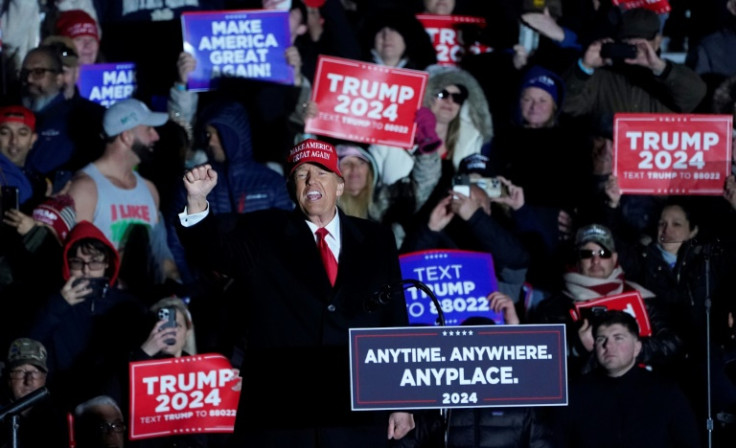
NEW YORK CITY - Presumptive GOP nominee Donald Trump said he'd use the National Guard "as he sees fit" throughout American cities to deport immigrants if he's reelected. The claim comes as he ramps up his anti-immigration rhetoric ahead of the November elections.
The remarks were made in a rare and lengthy telephone interview with Time magazine in early April. The conversation was published online this week.
"If I thought things were getting out of control, I would have no problem using the military," he said. "We have to have safety in our country. We have to have law and order in our country. And whichever gets us there, but I think the National Guard will do the job."
The former president didn't mention exactly how exactly he'd carry out the deportation operations and what role the National Guard would play in them, but said that if he's not able to use the National Guard, he would consider using "other parts of the military" to carry out this operation.
U.S. military forces— both National Guard and active duty— have historically been used at the border to back up immigration personnel. However, using National Guard forces, or active-duty military, to help directly with deporting migrants, especially in the interior of the country, would be a drastic escalation of their use in the immigration sphere and would likely run into legal challenges, according to The Associated Press.
At the same time, presidents have used troops, often National Guard forces, to bolster border security in different ways. Presidents Biden and Trump have used active duty troops and National Guard forces to bolster border security. But these troops have been used in specific, restricted ways like data entry, surveillance or warehouse support or to provide logistical support in ways that don't interact directly with migrants.
Trump also told Time he plans to sign orders to reinstall many of the same policies from his first term, such as the Remain in Mexico program, which requires that non-Mexican asylum seekers be sent south of the border until their court dates. He would also be looking at reinstating Title 42, which allows border officials to expel migrants without letting them apply for asylum.
The former president's advisers say he plans to cite record border crossings and fentanyl and child-trafficking as justification for reimposing the emergency measures. He would also direct federal funding to resume construction of the border wall, likely by allocating money from the military budget without congressional approval.
"People need to be deported," said Tom Homan, a top Trump adviser and former acting head of Immigration and Customs Enforcement. "No one should be off the table."
Throughout his various campaigns over the years, the businessman turned politician has made similar promises, some of which have yet to come into fruition.
When it comes to his promises of the wall, many challenges arise. One of the largest ones being the large financial outlay required to build it. In his 2016 election campaign, he said it would cost only $12 billion. But a 2017 Department of Homeland Security internal report said it would likely cost $21.6 billion, but even that number could be a major underestimate. As the years have passed, that figure has likely increased exponentially.
In relation to his drug-trafficking claims, while it is true that most illicit fentanyl is passed across the border, the substance is primarily transported by U.S. citizens, not migrants. In fact, about 90% of the fentanyl seized at the border in recent years took place at legal crossings, which undocumented migrants generally avoid, and 91% of the seizures were from citizens, according to The Los Angeles Times.
Trump has made cracking down on immigration a centerpiece of his reelection campaign, repeating a strategy that worked for him when he first ran for office.
Throughout this campaign season, he's accused migrants of "poisoning the blood of the country," of invading the country, claimed that most immigrants crossing the border are immigrants and even referred to them as "animals," according to The Washington Post.
© 2024 Latin Times. All rights reserved. Do not reproduce without permission.







